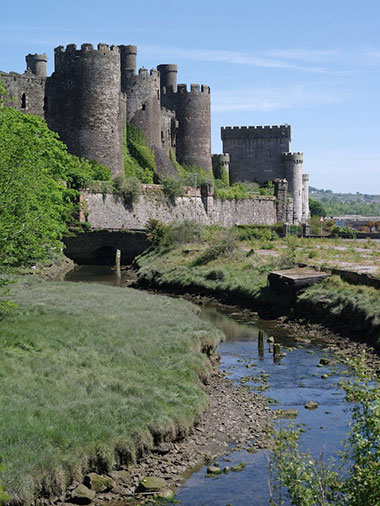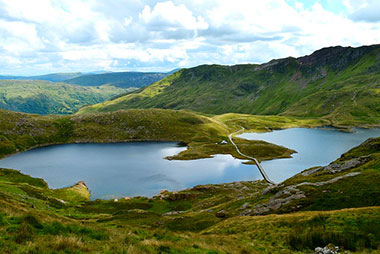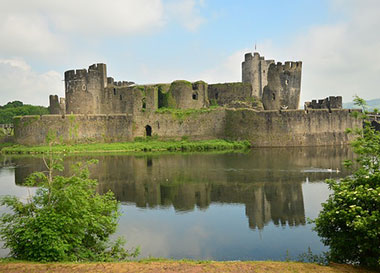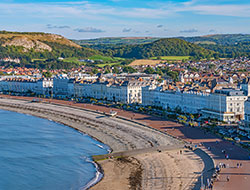Travel > Europe > UK > WalesWalesCastles, Scenic Wonders and Medevial TownsWales is a unique destination that might have escaped your radar, yet holds incredible opportunities for exploration. With its rich history, stunning landscapes, and charming towns, Wales offers a diverse range of experiences with enchanting cities and activities that will delight those who wish to delve deeper into the UK experience. Cardiff - The Vibrant Capital
Conwy - A Glimpse into History
Llandudno: Seaside Victorian Charm
Hay-on-Wye - A Literary Haven
Natural Wonders: National Parks
Tenby
Best Time to Visit:The best time to visit Ireland ultimately depends on your interests and the experiences you seek. Each season has its unique charm, so choose the one that aligns with your preferences and expectations. Keep in mind the weather in Wales can be unpredictable, so be prepared for rain at any time of the year. Spring (March to May): Spring in Wales is a time of renewal. The Welsh landscape comes to life with lush greenery, and flowers bloom across the countryside. It's an excellent time for outdoor activities like hiking, biking, and exploring national parks. Don't miss St. David's Day on March 1st, which is a national celebration featuring parades and cultural festivities throughout the country. Summer (June to August): Summer is the warmest and most popular season in Wales. The weather is at its best, making it ideal for exploring coastal areas like the Gower Peninsula and trying water sports along the Welsh coast. You can also immerse yourself in Welsh culture by attending music festivals and various cultural events held across the country during this season. Autumn (September to November): Autumn in Wales is a picturesque season as the foliage changes to stunning shades of red, orange, and gold. It's a great time to explore historical sites such as castles and ancient ruins, including Conwy Castle and Tintern Abbey. Food enthusiasts will appreciate the seasonal delicacies at various food festivals, such as the Abergavenny Food Festival, held the third weekend of September. Winter (December to February): Winters in Wales are relatively mild, but the country takes on a festive atmosphere during this season. Cities like Cardiff and Swansea come alive with Christmas markets, decorations, and holiday spirit. If you prefer indoor attractions, you can explore museums, galleries, and cozy pubs, such as the National Museum Cardiff and the historic pubs in Hay-on-Wye. The rugged landscapes of Snowdonia and the Brecon Beacons still offer dramatic scenery for those willing to explore, but be prepared for colder and potentially wet weather. Travel Planning Tips:Whether you're captivated by Wales' historic sites, stunning landscapes, or vibrant cities, these guidelines will help you make the most of your visit.Plan Ahead: Before embarking on your Welsh adventure, research the cities, regions, and attractions that interest you. Create a list of must-see places and plan your itinerary accordingly. Wales boasts a rich history, diverse culture, and breathtaking natural beauty, so tailor your trip to your preferences. Cash and Currency: In Wales, the official currency is the British Pound (£). (As of 2020, the UK no longer uses the Euro.) Notify your bank about your travel plans to avoid any unexpected issues with your credit or debit cards. While cards are widely accepted, it's advisable to carry some cash, especially for small purchases and in more rural areas where card acceptance might be limited. Be aware of local tipping customs, especially in restaurants and for services like taxis. Travel Insurance: Ensure that you have comprehensive travel insurance that covers medical expenses, trip cancellation, and any potential emergencies. Review the policy details and know how to access medical assistance if needed. Check Visa Requirements: Check visa requirements based on your nationality. Depending on your status, you may need a visa to enter the UK (which includes Wales). Verify that your passport is valid for at least six months beyond your planned departure date. Pack Accordingly: Wales experiences a temperate maritime climate, which means weather can be changeable. Pack clothing suitable for the season of your visit. An umbrella is a handy travel companion, and layering allows you to adapt to varying conditions, even within the same day. Comfortable walking shoes are a must, as you'll likely do a fair amount of walking while exploring cities and attractions. Don't forget to bring a universal power adapter for charging your electronic devices. Local Etiquette: When in Wales, respect local customs and etiquette. The Welsh are known for their hospitality, so be courteous and polite in your interactions. It's common to queue in an orderly fashion, and you'll find that the Welsh are friendly and welcoming. In traditional Welsh pubs, you may also order and pay for your food and drinks at the bar, allowing you to fully immerse yourself in the local pub experience. Accommodations:Hotels: Wales offers a diverse selection of hotels, catering to a range of budgets and preferences. Many hotels are equipped with amenities suitable for older travelers, including elevators, accessible rooms, and on-site dining options. When booking your stay, it's worth inquiring about any senior discounts or special rates that may be available. Guesthouses and Bed & Breakfasts: If you're looking for a more personal and cozy experience, consider staying at a guesthouse or B&B in Wales. These accommodations are often family-run, providing a warm and intimate atmosphere. It's a great way for retirees to connect with locals and immerse themselves in the genuine Welsh hospitality. Spa and Wellness Resorts: Wales offers numerous spa and wellness retreats for those seeking relaxation and rejuvenation. These establishments provide an array of revitalizing treatments, thermal baths, and relaxation facilities. Consider staying at one of these retreats in scenic regions like Snowdonia, Pembrokeshire, or the Brecon Beacons, where you can unwind in the midst of natural beauty. Transportation:Wales offers a variety of transportation options to accommodate different travel preferences and needs, allowing you to explore this stunning country with convenience and flexibility. Here's some valuable information for getting around in Wales:LEAP Card: Dublin, the capital of Ireland, has its own contactless smart card for public transport called the "Leap Card." The Leap Card can be used on buses, trams (LUAS), DART (Dublin Area Rapid Transit) trains, and some commuter rail services in the Greater Dublin area.The Leap Card offers the convenience of touch-and-go travel and can be preloaded with credit for various travel needs. You can order a Leap card online via the LEAP card web site or obtain one from transportation hubs such as airports, DART stations, tram stops or retailers. Ferries and Domestic Flights: Depending on your itinerary, you may need to consider ferries for traveling between Wales and its offshore islands. Domestic flights are available for more remote destinations, but they may be more practical for longer journeys. Companies like Aer Lingus operate regional routes, providing options for those looking to save time. Trains: Wales has a well-developed rail network managed by Transport for Wales. Trains connect major cities and regions, offering both convenience and scenic journeys. Booking tickets in advance is advisable, especially for peak times and long-distance routes. Rail passes may be a cost-effective option for extended travel. Buses: Wales features an extensive network of bus services, connecting cities, towns, and rural areas. Various operators, including national and private companies, provide routes to different destinations. Tickets can often be purchased from the driver or through mobile apps, making it a cost-effective means of travel. Consider day passes or regional cards for unlimited bus travel within specific areas. Rental Cars:International and local car rental companies, such as Hertz, Avis, Europcar, Enterprise, and Budget, operate in Wales. You can find rental offices at major airports, cities, and popular tourist destinations. Remember that in Wales, as in the rest of the UK, driving is on the left side of the road. Cars there usually have the steering wheel on the right side so you may need to adjust to this. While the road network is generally well-maintained, be prepared for narrower and winding roads, especially in rural areas. Roundabouts are common traffic features, so acquaint yourself with roundabout rules and lane usage. Taxis:Taxis are a safe and reliable means of transportation in Wales. Look for licensed taxis with a taxi sign on the roof and an in-car meter. Fares are typically distance-based, with additional charges for luggage or late-night rides. Taxis commonly accept both cash and credit cards, and tipping is customary. Public Transportation:Welsh cities have efficient public transportation systems, including buses and trams. For instance, Cardiff has a well-connected bus network, and the Cardiff and Valleys Metro offers convenient tram services. Tickets can often be purchased from ticket machines or drivers. Explore options like day passes or multi-day passes for unlimited travel within specific cities or regions. Safety Tips:Wales is generally a safe destination, but it's important to stay vigilant and follow these safety guidelines to ensure a secure and enjoyable visit:
|
 Conway Castle Conway CastlePhoto by Chris Black / Pexels  Snowdonia National Park, Wales Snowdonia National Park, WalesPhoto by Joanna Rycerz / Pixabay  Caerphilly Castle, Cardiff Caerphilly Castle, CardiffPhoto by Caohuyensa / Pixabay | |||||||||||||||||||||||||
